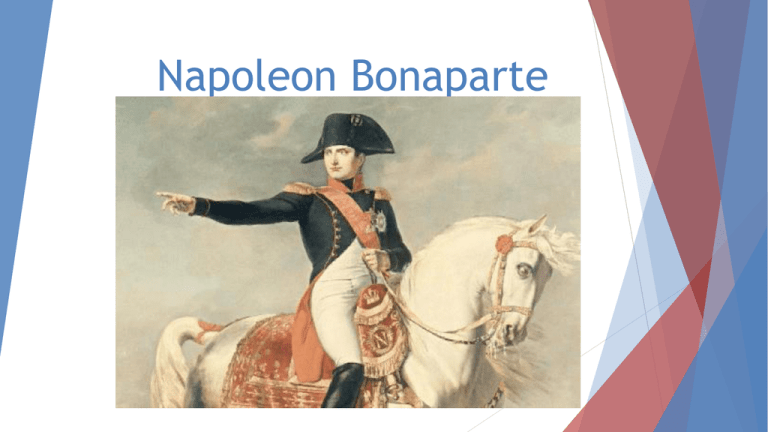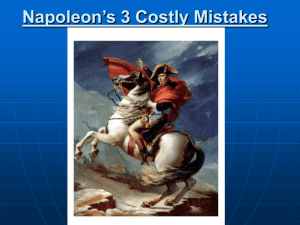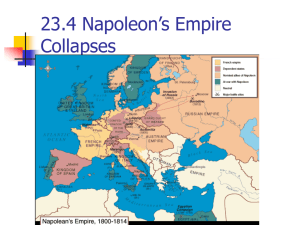Napoleon Bonaparte
advertisement

Napoleon Bonaparte Rise of Napoleon 24 years old is made a general by the Committee of Public Safety At 26, he becomes commander of French armies in Italy Gains fame for victories in Italy France wants him to invade Britain He knows that invasion will fail, so he invades Egypt instead Invasion of Egypt also fails Consul and Emperor 1799 Napoleon takes part in coup d’état that overthrows the Directory. A consulate government is set up Napoleon is named the first consul 3 years later he gets named consul for life 1804, Napoleon is crowned Emperor Peace with the Church Napoleon knows it’s good to mend relationship with the Church Makes deal with the pope Catholicism is recognized as the religion of the majority of France In return, the pope will not ask for the return of seized Church lands from the Revolution Catholic Church is no longer an enemy of the State People who seized lands now support the government. Codification of the Law Institutes Napoleonic (Civil) Code – unifies all the laws of France the equality of citizens before the law the right to choose your own profession religious toleration abolition of serfdom + feudal obligations women No less equal than men inheritance rights for daughters A New Bureaucracy public officials + military officers promoted on ability Aristocracy (noble class) based on meritorious service to nation Preserver of the Revolution??? Liberties taken away newspapers banned books government Mail shut down controlled publishing confiscated + opened by police Building the Grand Empire Napoleon builds France and becomes the greatest power in Europe at the time. Known as the Grand Empire The Grand Empire would consist of three parts French Empire Dependent Allied states states Building the Grand Empire…. The French Empire France and its new extended boundaries The Dependent States Kingdoms ruled by relatives of Napoleon Unified Spain - brother Holland German States – brother The Allied States Countries defeated by Napoleon Russia, Prussia, Austria Building the Grand Empire…. Napoleon spreads the ideas of the French Revolution Legal Equality Religious toleration Economic freedom Clergy and nobility have all special privileges taken away Napoleons system of merit instituted in new states Napoleon hoped to build a long lasting French Empire Two factors lead to its demise Britain Nationalism Britain Napoleon wants to invade Britain and conquer. British navy too strong for Napoleons forces French defeated trying to invade Continental System Napoleons new plan to defeat British Set up a blockade against importing British goods, try to bankrupt them System fails Allied Too states go behind his back many markets worldwide to try and stop British trade Nationalism Sense of identity of a people based on Common language Religion National symbols Conquered people are not forced to take on French culture Still unified by their own culture Resentful of invaders Russia Under control of Napoleon, but ignoring Continental system Must be punished Napoleon sets out with 600,000 men Only brings enough supplies for 26 days Set precedent for other countries Depending on quick victory War would last 6 months Russians strategy baffles Napoleon Refuse to fight Retreat further into Russia Burn fields and homes along the way Russia… Napoleon finally reaches Moscow Russian capital Wins two battles along the way, but costly victories Finds it set ablaze Tens of thousands of men die in battle Begins Great Retreat Napoleon makes decision to leave Russia Still in the dead of winter Thousands of troops are lost Starvation Hypothermia Suicide Less than 40,000 out of 600,000 make it back Downfall of Napoleon Disaster in Russia leaves France vulnerable to surrounding countries Napoleon defeated Exiled to island of Elba Louis XVIII restored as monarch in France Brother of Louis XVI Napoleon escapes Elba and returns to France to claim his empire Foreign armies rally together to finish Napoleon for the last time Napoleon defeated at Waterloo in Belgium Duke of Wellington leads British and Prussian troops Defeated, Napoleon is exiled to St. Helena Dies in exile in 1821









